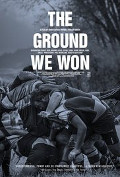
Directed by
Christopher Pryor / Miriam Smith
96 minutes
Rated MA
Reviewed by
Bernard Hemingway

The Ground We Won
Directors Christopher Pryor and Miriam Smith spent a year living in the rural town of Reporoa, midway between Rotorua and Taupo, in New Zealand, in order to make their about the town’s struggling rural rugby club and its attempts to win back supporters in the looming competition season.
All this will be of cursory interest to most viewers but then The Ground We Won is not really about rugby so much as it is about community, mateship, hard work and survival, all beautifully presented by Pryor and Smith in limpid black and white imagery without any narration or explanatory embellishment.
Clearly the film has been skillfully shaped in the editing room but its primary mode is disinterestedly observational as it juxtaposes the men's day-to-day activities as dairy farmers with the weekend matches, invariably followed by Gargantuan drinking sessions. There are a couple of focal points, principally a rotund single father who functions as a kind of emblem of a male's life in Reporoa, but we know nothing more of them than what the camera sees and hears.
And a male-dominated world it is, steeped in male camaraderie from which women are automatically excluded. In one sequence the men “induct” a young Englishman, barely out of his teens, forcing him to drink copious amounts of beer. In another they get in a lap dancer to flaunt her charms, a ritual clearly devised to suppress the homo-erotic tendencies that permeate their psyche
It all makes for a beguiling mix of the crude and the sublime. In this respect The Ground We Won is a deserving heir to the tradition of "ethnographic" documentary begun by Robert Flaherty in the 1930s.
Want something different?





